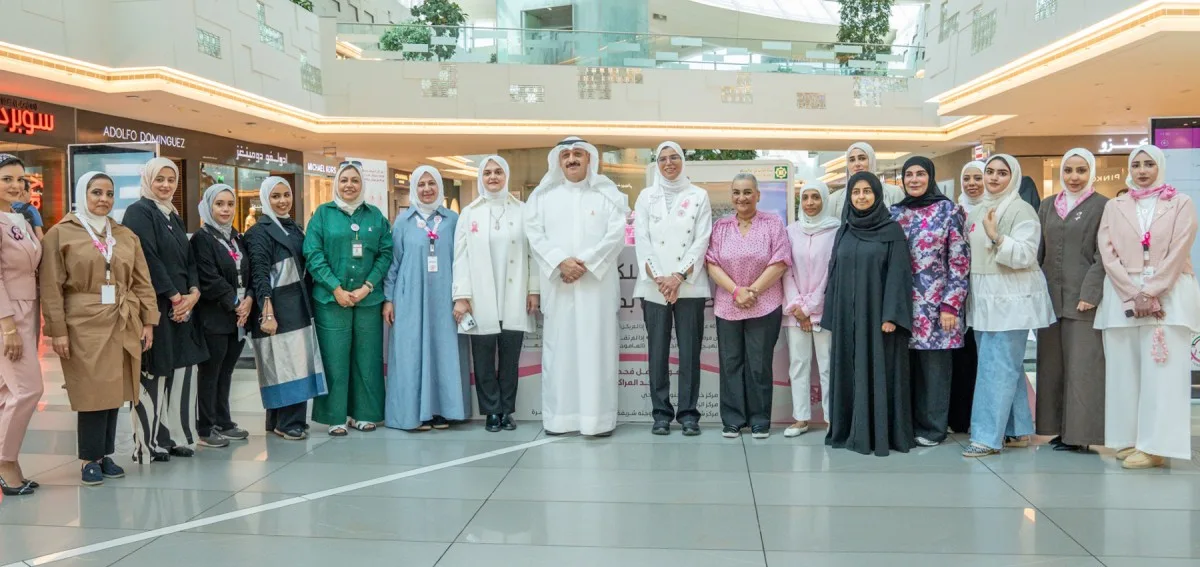19/10/2024
19/10/2024

KUWAIT CITY, Oct 19: Minister of Health Dr. Ahmad Al-Awadhi announced that since its launch in 2014, the national program for early detection of breast diseases has screened approximately 40,000 women, identifying around 400 cancer cases through mammograms. He emphasized that early detection significantly boosts the recovery rate to nearly 98 percent.
Speaking to the Kuwait News Agency (KUNA) on Friday during an awareness event at the Avenues Mall, part of the Ministry of Health’s "Pink October" campaign under the slogan "Your Examination Now Means Safety," Minister Al-Awadhi highlighted that the national program plays a critical role in detecting breast cancer at early stages, preventing progression to more advanced stages.
He noted the Ministry's commitment to providing mammogram centers across various governorates, as well as in hospitals throughout the year. The program focuses on the prevention and early detection of breast cancer among women aged 40 and above, offering high-quality screenings.
Minister Al-Awadhi expressed pride in the program, which offers diagnostic breast scans for early cancer detection. These periodic screenings include mammograms and, in some cases, a clinical examination by a family doctor, along with self-examinations by the patient.
He stressed that treating cancer patients remains a top priority for the Ministry, which has developed numerous programs for early detection, treatment, and support for scientific research. Additionally, the Ministry focuses on drug security, ensuring the availability of cancer medications despite their complexity and variety.
The Minister also highlighted the importance of organizing awareness programs, which are a key component of the Ministry’s efforts to educate the public and facilitate early detection and treatment.
Dr. Asmaa Al-Hussein, Head of the National Program for Early Detection of Breast Diseases, told KUNA that the Ministry is keen on joining the global community in observing Breast Cancer Awareness Month by holding various awareness programs during "Pink October." She noted that program centers are located across most governorates, including Al-Zahra, Al-Naeem, Khaitan South, Surra, and Al-Aqila, where women from the target group are welcomed, provided they do not have symptoms and are neither pregnant nor breastfeeding. Appointments are booked through the (Sahel) and (Kuwait Health) platforms, with mammograms read at the main center.
Al-Hussein explained that if additional tests are required, they are conducted at the main center before a diagnosis is made and the patient is referred to the appropriate facility. She also emphasized the program's efforts to raise awareness of risk factors contributing to breast cancer.
She reiterated the importance of early detection in improving treatment outcomes, noting that most studies show early detection increases recovery rates and shortens the treatment period.
Dr. Buthaina Al-Kandari, Head of the Radiology and Radiotherapy Departments Council, Vice President of the Program, and Head of the Technical Committee, told KUNA that the goal of the awareness event is to encourage women to undergo regular mammogram screenings, which take less than 30 minutes. These screenings are available year-round, and Dr. Al-Kandari urged women to take advantage of them for early diagnosis, which significantly improves the chances of successful treatment. Early detection also provides more treatment options and increases the likelihood of full recovery.
Dr. Latifa Al-Kandari, Head of the Radiology Department at Al-Adan Hospital and a member of the program's Higher Committee, addressed several misconceptions circulating on social media, such as claims that mammograms can cause thyroid cancer or spread existing cancer. She clarified that these rumors are entirely false, assuring the safety of mammogram screenings. "Breast X-ray imaging exposes patients to minimal radiation, which does not pose harmful effects," she said, emphasizing that the benefits far outweigh any potential risks from radiation exposure. (KUNA)


